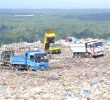DAVAO CITY, Philippines — A nationwide coalition of environmental advocates sees no positive gain in Davao City’s planned P2.5 Billion Waste-to-energy project with the Japanese International Cooperation Agency (JICA).
Davao City is planning to build a waste-to-energy facility to reduce the city’s solid waste and convert it into electricity. The waste-to-energy plant to be built in Biao Escuela, Tugbok, Davao City is expected to accommodate 600 tons of waste per day and can generate around 12 MW of electricity.
No Burn Pilipinas, an environmental advocate group led by Ecowaste Coalition says that while waste-to-energy seems appealing as a solution to waste management and energy issues, “they undermine recycling efforts and renewable energy alternatives and they may actually consume more energy than they produce”.
“We at No Burn Pilipinas call on LGUs to discontinue such projects as they are not only harmful and unsustainable. They may also derail efforts at proper solid waste management. Instead, planning and funding should be directed towards the reduction of waste products including the promotion of comprehensive efforts at recycling and investment in renewable energy sources” say Glenn Ymata of No Burn Pilipinas.
A similar waste incineration power plant was planned to be built in Brgy. San Agustin, Tagum City. Other plants are being set up across the Philippines with the National Solid Waste Management Commission approving plans by the city governments of Quezon City and Cebu City. Puerto Princesa and Laoac, Pangasinan are also intending to build waste-to-energy facilities.
Ymata also told media that Mayor Sara is “misled with a false idea” that the problem of excessive waste of the city can be solved through technology as Solid Waste Management is part of her 10 priority agenda to address an efficient and sustainable waste management in the city. The group said that they are willing to sit down again with the city mayor to talk about waste management and propose possible solutions to the waste disposal problems of the city.
“We fully understand that Mayor Sara wants to leave a legacy in giving a solution to the waste problem of the city. But the thing is the solution they are giving is not viable to human, the environment and the law,” Ymata said.
The waste incineration projects involve the creation of facilities for the burning of municipal waste (all combustible nonrenewable materials leftover from a segregation process such as paper, plastics, glass). Most of today’s waste incineration plants are also waste-to-energy plants, i.e., by burning waste, they recover heat which is then converted to electrical energy.
The group says that the worse result of the waste-to-energy project is that, it can produce toxic emissions that “harm both people and planet” as well as contribute to the greenhouse gases which contribute to global warming.
“Aside from the negative effect of the waste incineration project to humans and the planet, it is also being banned by law under Republic Act 8749 or otherwise known as the Philippine Clean Air Act,” said Ymata.
Romeo L. Lagahit of MinLand Foundation- Davao City sees the failure of proper implementation of the law as one the main reasons why the city has to face the problem of waste disposal.
RA 9003 or the Ecological Solid Waste Management Act of 2000 was crafted in response to the looming garbage problems in the country. RA 9003 declares the policy of the state in adopting a systematic, comprehensive and ecological solid waste management program that ensures the protection of public health and the environment and the proper segregation, collection, transport, storage, treatment and disposal of solid waste through the formulation and adoption of best environmental practices.
The law was crafted in response to the looming garbage problems in the country. It also promotes the benefits of recycling not only in addressing waste management problems but also in alleviating poverty.
“The local government of Davao sees the waste-to-energy project as a solution but it has a limited understanding of why we have a huge problem with our waste. We are lacking political will to strictly implement the law” said Lagahit.
Lagahit pointed out that the non-compliance with the law resulted with the ignorance of public on the segregation of waste.
Meanwhile, No Burn Pilipinas calls on LGUs to discontinue such projects as they are not only harmful and unsustainable andthey may also derail efforts at proper solid waste management.
“Instead, planning and funding should be directed towards the reduction of waste products, comprehensive efforts at recycling and investment in renewable energy sources.
They argued that cities in Mindanao are more than capable to become leaders in renewable and eco-friendly energy solutions, “thus there is no need to regress into waste incineration practices”.
“We also call for greater inclusivity in the deliberation of waste management and energy
generation so that affected communities and the wider public are more informed and have a greater capacity to partake in decision making processes regarding these matters.” (davaotoday.com)









